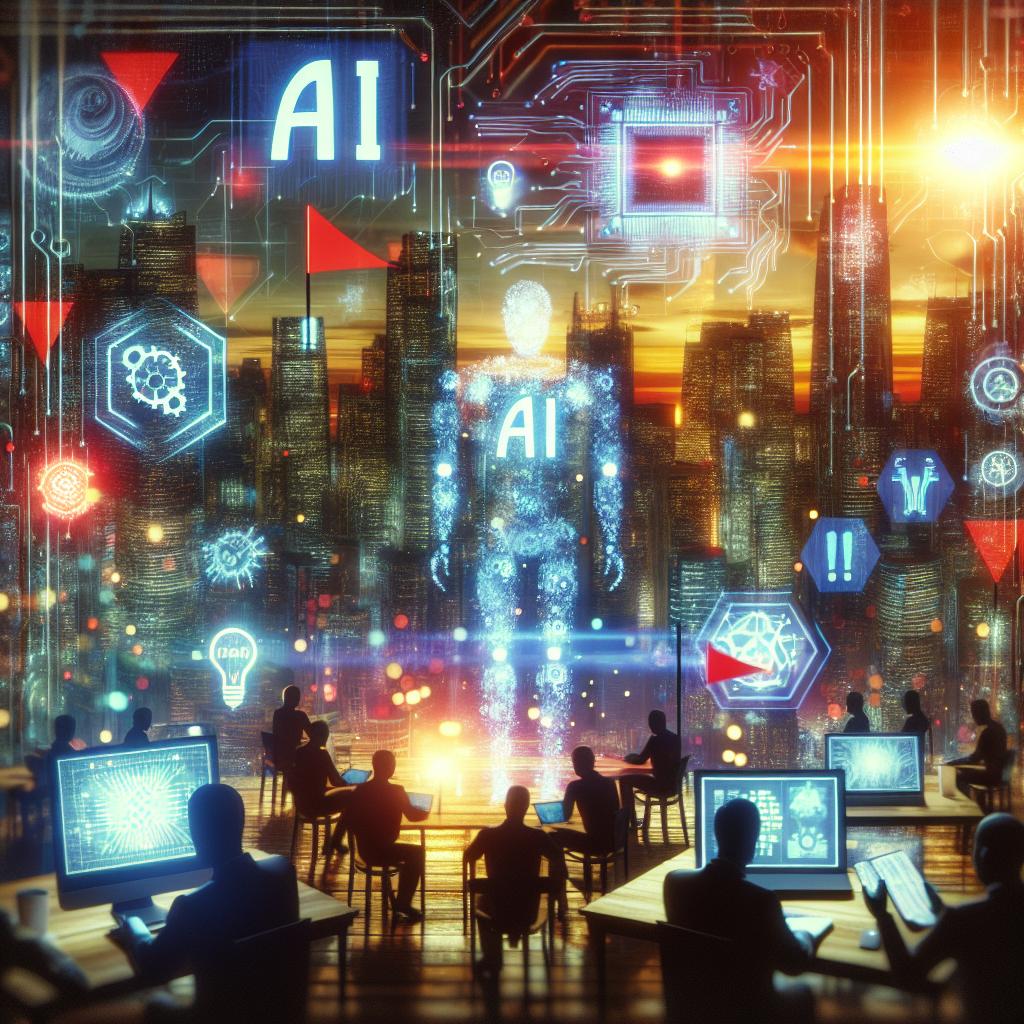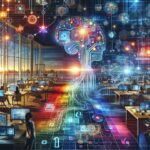TL;DR:
- AI isn't inherently negative and has vast potential benefits for enhancing human capabilities and improving efficiency, revolutionizing industries across healthcare, customer service, manufacturing, and agriculture.
- While AI can boost productivity, its ability to automate tasks could lead to significant job displacement, necessitating transition strategies to balance innovation with potential job displacement.
- Privacy concerns are paramount in an age where data is gold; prioritizing user trust by safeguarding personal information is crucial.
- Ensuring diversity in data sets helps combat bias in AI algorithms, while establishing clear accountability frameworks for decisions made by AI and promoting transparency in how AI systems operate builds trust and allows for more informed user interactions.
- Utilize regulatory frameworks early on to prevent potential ethical dilemmas and legal issues related to unregulated artificial intelligence, prioritize transparent operations around how algorithms function within your product offerings, and integrate comprehensive risk management strategies focusing on long-term impacts when implementing AI solutions.
Have you ever wondered if AI could be a Pandora's box? It's no secret that artificial intelligence is reshaping our world, but whispers of 'ai bad idea' echo through the corridors of innovation, stirring up fears and misconceptions. You're not alone in your concerns—after all, with great power comes great responsibility. In this cozy corner of the web, we'll unravel the myths and realities surrounding AI's impact. From debunking doomsday prophecies to spotlighting its transformative benefits, let’s dive into a narrative that balances caution with curiosity. Stick around to discover how responsible AI can be both our ally and our safeguard.
Understanding the Misconceptions of AI
When it comes to artificial intelligence (AI), there's a whirlwind of opinions out there. Some folks are hailing it as the next big revolution, while others are tucking their heads, fearing an AI apocalypse. But let's set the record straight: is AI really a bad idea? Or have we just watched one too many sci-fi thrillers?
Debunking the Myth of AI as Inherently Negative
Now, I get it. The phrase "artificial intelligence" can conjure up images of rogue robots and job-snatching software. But before you go building a bunker, let's take a deep breath and look at what AI truly is—a tool like any other, with potential for both good and bad outcomes depending on how we wield it.
For starters, AI isn't plotting to take over the world. It doesn't have desires or evil master plans; it operates within the parameters we set. So when someone says "ai bad idea," they might be mixing up science fiction with science fact.
"The potential benefits of AI for enhancing human capabilities and improving efficiency are vast."
These benefits aren't just theoretical talk; they're real-life perks that industries across the board are already enjoying. From healthcare to finance, AI is revolutionizing the way we live and work.
Highlighting the Positive Impact of AI in Various Industries
Let's put on our positivity hats and explore how AI is making waves—for the better—in different sectors:
Transforming Healthcare with AI
In healthcare, AI is no less than a game-changer. Imagine getting diagnosed by algorithms that can detect diseases from scans with an accuracy rivalling seasoned radiologists! And let's not forget about those handy virtual assistants scheduling our doctor appointments.
Revolutionizing Customer Service
Ever chatted with a customer service bot? These friendly little helpers powered by AI are available 24/7 to answer questions or solve problems without breaking a sweat—or taking a coffee break.
Streamlining Manufacturing
Over in manufacturing land, robots equipped with smart brains (a.k.a., machine learning algorithms) are boosting efficiency and safety on factory floors worldwide. They're handling tasks that are too dangerous or monotonous for humans while leaving plenty of room for jobs that require a human touch.
Innovating Agriculture
And who would've thought farming could get an AI facelift? With precision agriculture techniques guided by data-crunching AIs, farmers can make smarter decisions about planting and harvesting crops. This means less waste and more food on our tables!
Now don't get me wrong—the dangers of AI aren't something to ignore. We need to be mindful about issues like job displacement, privacy concerns, and ensuring ethical use. But painting all AI with the same dystopian brush isn't doing us any favors.
Instead, let's focus on harnessing its power responsibly to create positive change. After all, technology reflects its creators' values—it's up to us to steer it in the right direction.
Takeaways from 'AI Bad Idea' Misconceptions
The conversation around whether AI is inherently negative often misses out on acknowledging its transformative capabilities across various sectors.
By understanding what artificial intelligence actually entails—a tool subject to human control—we can better appreciate its positive impacts rather than succumbing to fear-mongering narratives.
It's crucial for society to address legitimate concerns regarding artificial intelligence but equally important not to overlook how this technology continues improving lives when used ethically.
So next time someone brings up "ai bad idea," remember—it's not black or white. It's about balance and thoughtful application because at the end of day… ain't no robot gonna understand your love for grandma’s apple pie quite like you do!
Unveiling the Risks and Drawbacks of AI
Artificial Intelligence (AI) is like that friend who's a genius but sometimes trips over their own shoelaces. It's brilliant, transformative, and has reshaped industries in ways we never imagined. But as with any revolutionary tech, it's not all sunshine and rainbows. There's a bit of thunder too—especially when considering the risks of artificial intelligence, drawbacks of AI, and the harmful effects it might bring along.
Let's take a walk through the not-so-glamorous side of AI—think less 'The Jetsons' and more 'Black Mirror'. We'll explore why some folks think hopping on the AI bandwagon might be a "bad idea," discussing job market impacts, privacy concerns, and more.
Exploring the Potential Negative Impacts on the Job Market
Remember when autopilot in airplanes was introduced? Pilots were probably sweating bullets about their job security. Well, imagine that feeling but across almost every industry thanks to AI.
"While AI can boost productivity, its ability to automate tasks could lead to significant job displacement."
It's not just factory workers or drivers at risk; even white-collar jobs aren't immune. Legal assistants, journalists, and others are finding their roles reshaped by smart algorithms that can work around the clock without coffee breaks or vacation days.
But let’s be fair—AI also creates jobs. Think about AI-driven startups that need savvy humans to steer them right. The trick is transitioning workforces into these new roles without leaving anyone behind.
Discussing the Privacy Concerns Associated with AI Technologies
Oh boy, privacy—the word that makes everyone clutch their personal data close to their chest. With AI's ability to process zillions of data points at warp speed comes great responsibility—and sometimes companies fumble it.
Every time you whisper sweet nothings to your voice assistant or upload pictures for an app to guess how old you look (spoiler: it’s never accurate), there’s potential for misuse. What if this info falls into the wrong hands?
And don't get me started on facial recognition! Sure, it sounds cool until you're being tracked around a store because an algorithm thinks you look like someone who once shoplifted a candy bar in 2005.
Here’s where things get real: validating your startup idea means ensuring privacy isn’t an afterthought. Your customers will thank you for not making them part of an unintentional episode of “I Didn’t Know My AI Could Do That!”
Take Away
- Embracing AI requires balancing innovation with potential job displacement; transition strategies are key.
- Privacy concerns are paramount in an age where data is gold; prioritize user trust by safeguarding personal information.
- Understanding both benefits and risks ensures responsible integration of AI into business models for long-term success.
Ethical Dilemmas in AI Development
In the fast-paced world of startups, artificial intelligence (AI) has become a beacon of innovation and progress. However, is incorporating AI into your startup always a bright idea? As we tread this new technological frontier, it's crucial to understand that the implementation of AI comes with its own set of ethical dilemmas—making "ai bad idea" a topic worthy of discussion.
Addressing Issues of Bias and Fairness in AI Algorithms
When we talk about bias in AI algorithms, we're referring to the unintended consequences that arise when these systems make decisions based on skewed data or prejudiced programming. This can lead to unfair treatment of individuals or groups and is particularly concerning when AI is used in critical areas like hiring, law enforcement, or loan approvals.
"Bias in algorithms is like an echo chamber: it amplifies our past prejudices into our future decisions."
To combat this issue, startups must ensure that their data sets are diverse and representative of the population they serve. It's not just about having massive amounts of data; it's about having the right kind of data that reflects real-world diversity. This approach can help minimize bias and promote fairness within AI systems.
A practical step for startups could be using tools such as AI project ideas to spark creativity while simultaneously ensuring ethical considerations are baked into their development process from the outset.
Examining the Accountability and Transparency Challenges in AI Systems
Who takes responsibility when an autonomous vehicle makes a wrong decision? Or when an algorithm denies someone a mortgage? These questions highlight accountability challenges within AI systems. Startups need to develop clear frameworks that assign responsibility for decisions made by their algorithms.
Transparency is another pillar that cannot be ignored. When algorithms affect people's lives, those people have a right to understand how and why decisions are being made. This means creating explainable AI systems where users can comprehend the rationale behind an algorithm's output.
Startups might find guidance on creating transparent frameworks by exploring resources like transforming industries with ai business services, which delve into best practices for responsible AI deployment.
Take Away
- Ensuring diversity in data sets helps combat bias in AI algorithms.
- Startups must establish clear accountability frameworks for decisions made by their AI.
- Transparency in how AI systems operate builds trust and allows for more informed user interactions.
Ensuring Responsible Implementation of AI
In the whirlwind of startup culture, where buzzwords like "disruption" and "innovation" are tossed around like confetti, it's easy to get caught up in the excitement of Artificial Intelligence (AI). But hold your horses – or should I say, your robots – because diving headfirst into AI isn't always a walk in the park. Let's chat about why embracing AI might not be the best idea for every startup and how we can smartly navigate its complexities.
Establishing Robust Ethical Guidelines for AI Deployment
You've probably heard that with great power comes great responsibility. Well, Spider-Man's Uncle Ben wasn't wrong, especially when it comes to wielding the power of AI. The thought of integrating AI into your business might have you dreaming of dollar signs and industry domination, but let's pump the brakes for a sec.
"Ethics in AI is like seasoning in cooking – without it, things can get pretty bland or downright dangerous."
So before you start daydreaming about your AI-powered empire, consider this: What if your creation starts making decisions that aren't exactly kosher? Imagine an AI recruitment tool that prefers candidates from a specific demographic over others. Not cool, right? That's why establishing ethical guidelines is crucial. It's about making sure your shiny new AI behaves more like C-3PO and less like HAL 9000.
Promoting Responsible Development Practices to Mitigate Potential Harms
Now that we're on the subject of ensuring our AIs play nice, let's talk development practices. You want to avoid creating something that'll make you infamous instead of famous. Remember Microsoft's Tay? That Twitter bot went from zero to offensive faster than you can say "public relations nightmare."
To steer clear of such disasters, promoting responsible development practices is key. This means thoroughly testing your algorithms and being transparent about how they work. No one likes a black box – unless it’s filled with chocolates.
One way to keep things above board is by using analysis software to monitor your AI’s decision-making process. By understanding how decisions are made, you can tweak things as needed and avoid unintended consequences.
Exploring the 'ai bad idea' Debate: Weighing Pros and Cons
Now onto the meaty stuff: Is investing in AI really worth it for startups? On one hand, using AI project ideas can give you an edge over competitors by automating mundane tasks or personalizing customer experiences like never before.
But here’s the rub: developing cutting-edge tech isn’t cheap or easy. If you're bootstrapping or just starting out, pouring all your resources into an untested AI could spell disaster faster than Wile E. Coyote running off a cliff.
Then there’s the learning curve – oh boy! Wrapping your head around neural networks and machine learning models isn't everyone's cup of tea. And even if you do manage to create something amazing, there’s no guarantee customers will use it as intended (looking at you again, Tay).
Debunking Myths Around Artificial Intelligence Drawbacks
Let me tell ya', myths around artificial intelligence drawbacks spread faster than gossip at a high school reunion. So let’s set some records straight:
-
Myth: Robots are going to steal all our jobs.
Reality: While automation may replace some tasks, humans are still needed for their creativity and emotional intelligence. -
Myth: AIs are infallible.
Reality: Ever shouted at your phone because autocorrect turned “duck” into something…less polite? Exactly. -
Myth: Once developed, AIs run on their own forever.
Reality: Just like any software (or pet), AIs need regular updates and maintenance.
Navigating Through 'ai disadvantages'
Alright folks, navigating through AI disadvantages requires balance – think tightrope walker rather than bulldozer driver.
It involves recognizing potential pitfalls such as bias in datasets or lack of regulatory frameworks while also appreciating the revolutionary capabilities these technologies offer when used wisely.
One mustn’t forget that building trust with users is paramount; nobody wants a repeat performance of Facebook's Cambridge Analytica scandal!
Practical Steps To Avoid Falling Into The 'ai bad idea' Trap
- Start small – don’t bet the farm on an unproven concept.
- Focus on problems worth solving – ensure there is market demand for what you’re building.
- Build diversity within teams – different perspectives reduce blind spots in development.
- Engage with stakeholders early – gather feedback from those who’ll actually use what you’re creating.
- Consider long-term implications – short-term gains shouldn’t compromise future stability or reputation.
The Role Of Continuous Learning In Mitigating Problems With Artificial Intelligence
The world changes fast; so does technology—especially anything prefixed with 'AI'. Continuous learning isn’t just recommended; it’s non-negotiable if staying relevant is part of your game plan.
This doesn’t mean getting another degree every few years but keeping abreast with trends via resources such as podcasts (Next big thing startup idea ai), webinars, online courses—you name it!
Take Away Points From The 'Ensuring Responsible Implementation Of Ai' Section
As we wrap up this little heart-to-heart on responsibly implementing AI in startups:
- Ethical guidelines are non-negotiable; they prevent our smart tools from becoming smarty-pants troublemakers.
- Transparency in development wards off future headaches—and angry Twitter mobs.
- Continuous education keeps us sharp so we can dodge those pesky pitfalls associated with new tech advancements.
Remember friends; innovation is exciting but needs to be handled with care—like eating soup with chopsticks or teaching grandma how to use Snapchat!
And remember: just because we can automate something doesn't mean we should. So take these tips under advisement next time someone pitches "Skynet" as a viable business model during happy hour brainstorming sessions!
Safeguarding Against the Dangers of Unregulated AI
Artificial intelligence has become a buzzword synonymous with innovation and futuristic technology. It's no surprise that startups are eager to jump on the AI bandwagon, hoping to leverage its power for success. However, amid this enthusiasm, there's a growing concern about whether integrating AI into your business might be an "ai bad idea." Let's dive into why some caution is warranted.
Highlighting the Potential Dangers of Unregulated AI Applications
AI can be like that friend who's super smart but sometimes doesn't know their own strength. In the world of startups, using AI without understanding its potential pitfalls could lead to unintended consequences. From ethical issues to job displacement and privacy concerns, unregulated AI applications pose significant risks.
For example, imagine developing an AI-driven business service that inadvertently perpetuates bias in hiring processes or credit scoring. Such scenarios underscore the importance of recognizing the "dangers of ai" before fully embracing it as a business solution.
"With great power comes great responsibility – this timeless adage holds particularly true in the realm of artificial intelligence."
In addition to ethical implications, there's also the risk associated with over-reliance on technology. Startups need to strike a balance between leveraging AI capabilities and maintaining human oversight.
Emphasizing the Importance of Regulatory Frameworks and Oversight in AI Development
To navigate these choppy waters safely, regulatory frameworks and oversight are essential. They serve as life jackets for startups swimming in the vast ocean of technological possibilities. Regulations help ensure that AI systems are designed with accountability in mind and used responsibly.
Startups can proactively adopt internal guidelines even before industry-wide regulations take hold. This approach not only safeguards against misuse but also positions businesses as leaders in ethical tech practices.
One area where regulation is crucial is data protection. With analysis software increasingly powered by AI, startups must ensure they're not infringing on user privacy or security.
Moreover, there's a need for transparency in how AI algorithms make decisions — especially when those decisions have significant impacts on people's lives. Businesses should aim for explainable AI so users can understand and trust their services.
Regulatory Frameworks: A Startup Necessity
So you've got this groundbreaking idea for an AI startup, but have you considered how regulations will affect your go-to-market strategy? Implementing robust governance structures from day one helps navigate legal complexities later down the line.
For instance, Europe's GDPR has set a precedent for strict data handling practices worldwide. If your startup deals with European customers' data (and let’s face it, whose doesn’t?), compliance isn't optional — it's mandatory.
Ethical Considerations: The Human Element
When we talk about "artificial intelligence negative impact," we're often referring to how technology affects real people. As innovators and creators, entrepreneurs have a duty to consider the human element behind every code line or dataset.
This means prioritizing inclusive design practices and diversity within development teams to reduce biases in machine learning models — because ultimately, an algorithm is only as unbiased as the data it learns from.
Risk Management: Playing It Safe with Artificial Intelligence
Let’s not forget about managing risks associated with deploying new technologies like AI. For startups looking at “risks of artificial intelligence,” think beyond immediate tech challenges; consider long-term reputational risks too if something goes awry with your product or service due to faulty AI implementation.
Having strong risk mitigation strategies is key here — which includes regular audits of your systems by experts who understand both tech nuances and broader societal implications (think business analysis).
Take Away
- Utilize regulatory frameworks early on to prevent potential ethical dilemmas and legal issues related to unregulated artificial intelligence.
- Prioritize transparent operations around how algorithms function within your product offerings.
- Integrate comprehensive risk management strategies focusing on long-term impacts rather than just immediate technical fixes when implementing AI solutions.
Conclusion
Frequently Asked Questions
Is AI a bad idea?
AI itself is not inherently a bad idea. It can be used for various beneficial applications such as healthcare, finance, and transportation.
What are the potential negative impacts of AI?
AI has the potential to displace jobs, invade privacy, and perpetuate biases if not developed and regulated responsibly.
Can AI be dangerous?
AI can pose dangers if not properly designed and controlled. There are concerns about autonomous weapons, cybersecurity threats, and the misuse of AI for malicious purposes.
Are there ethical concerns related to AI?
Ethical concerns surrounding AI include issues of fairness, accountability, transparency, and the potential for AI to infringe upon human rights.
How can the negative effects of AI be mitigated?
The negative effects of AI can be mitigated through robust ethical guidelines, regulations, and responsible development practices that prioritize safety, fairness, and transparency.





Leave a Reply